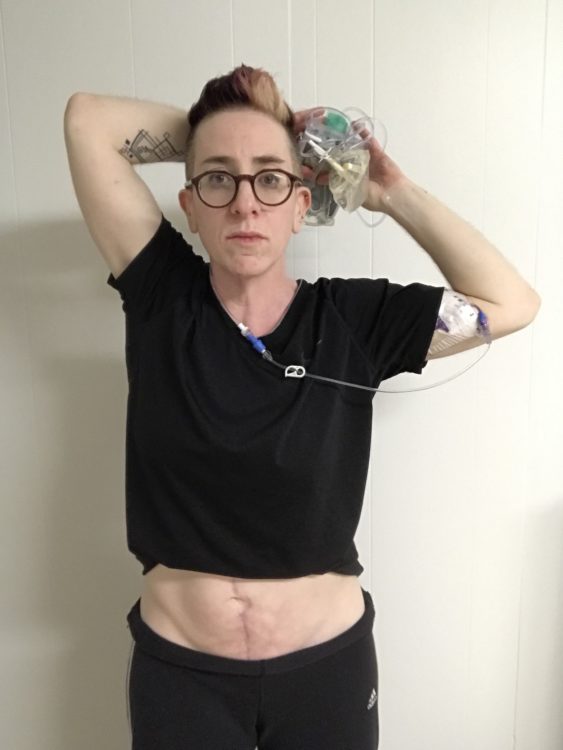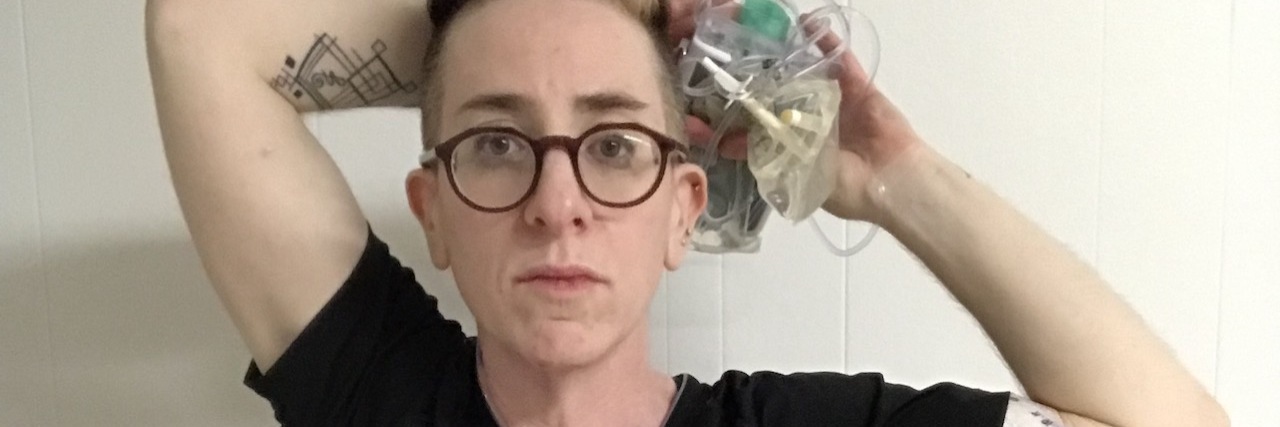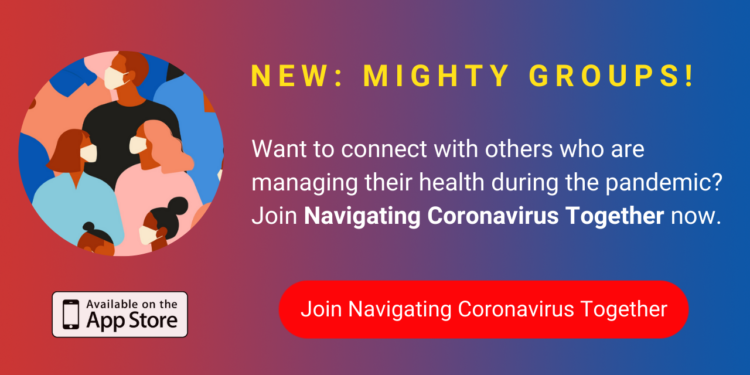When I Was Treated Badly for Trying to Keep Myself Alive
“Can I ask why you’re not wearing a mask?” I gently said to the young man, probably a college student, at the grocery store.
I had on my tight fitting N95 mask and latex gloves because I can’t risk a mask-free COVID carrier coughing in my direction while in public. If I get COVID, it’ll most likely be a death sentence. I’m immunocompromised from multiple conditions making simple errands terrifying now. I became disabled after losing four organs to three cancers in 2014, at the age of 42 years old. I had ovarian cancer, which required 18 weeks of chemotherapy, as well as colon and endometrial cancer. I also had melanoma in my leg in 2011 which required three surgeries to remove because it was so large.
Three individual cancers all at once is extremely rare in the general population. But it’s not uncommon for those of us with Lynch syndrome, a genetic disorder marked by high rates of cancer at young ages, especially colon cancer.
My fellow “Lynchie” uncle is currently battling two different cancers during COVID. My dad had three different cancers before he died last year. He was a three time Ironman and ran, biked and did Crossfit in his 70s when lung cancer finally got him. I watched my super strong, athletic dad slowly suffocate to death in a matter of weeks — just like how many die from COVID.
At least he was surrounded by loved ones when he died, I remind myself. I’m petrified now that my last moments will be alone, gasping for air in a hospital room with only strangers nearby.
My list of traumas had already piled high before COVID struck our nation. I’ve been dealing with chronic pain, grieving my dad, struggling to find doctors, fighting for government benefits and terrified of hospitals. I’d already lost my independence, financial security and a successful career as a nutritionist and cooking instructor in 2016 when I got so sick I had to quit my job and leave my San Diego apartment to live with family in Seattle. Becoming disabled in America in my mid-40s was a hideous awakening to how cruelly we treat the sickest and most vulnerable people in our “individual first” country. I’m still waking up to how privileged I was before, and still am in so many ways, which is why I share my story.
During my 2014 surgery, they didn’t take “just” organs. In order to make sure they got all the cancer out, they removed blood vessels, lymph nodes and nerves. This leaves me with twisted, scarred intestines and a butchered nervous system that causes pain throughout my torso. I survive on a mostly liquid diet because solid food can’t travel through my wrecked digestive system. Eating and pooping is a daily struggle. I’ve researched surgery options to fix things but have been told additional surgery is very risky for a case like mine.
This means my body doesn’t work right but not in the way that most people perceive disability. I live on a very restrictive diet and have to do a lot of movement in order to digest the little food I consume. I also require daily IV bags of fluids and nutrients via a permanent PICC line in my arm because of chronic dehydration and gut absorption problems. I’ve been homebound much of the last few years due to fatigue issues. I’ve worn surgical masks and latex gloves to the doctors for years since my immune system is so compromised. Pandemic life is my normal.
The basic precautions that so many Americans are resisting, are the norm for many disabled/medically fragile people and their family members. They can’t risk bringing anything home that could kill their loved one! And what about the many BIPOC who are dying at higher rates because they’re working the front lines? And forced to deal with systemic racism in the healthcare system? It’s extremely frustrating and depressing that some of my fellow citizens consider wearing a mask an inconvenience when it puts so many lives at risk.

It’s also really hard when I’m treated badly in public now for trying to keep myself alive. I realize that for many able bodied people who have no experience with invisible disability, it can be confusing because I appear “healthy.” I intentionally chose this photo because it shows the PICC needle in my arm, my IV bag and the mysterious mottling on my belly, making some of my invisible illness visible.
I don’t understand why there isn’t more compassion and empathy for people who are disabled and medically fragile at all times, but especially during this pandemic. Nobody plans on being born with a genetic mutation. Nobody anticipates becoming disabled part way through life. Nobody thinks they’ll go from healthy to chronically ill overnight.
Nobody thinks that a tragic “thing” will happen to them — that’s precisely what makes it tragic.
Roughly one in four of the American population — 61 million people — are considered disabled. And yet we’re barely considered during this pandemic, let alone given extra care and protection. Compared to what so many disabled people endure for years, it’s astonishing that some people whine about wearing a cloth mask for a half hour.
Unfortunately, many COVID survivors are going to become medically fragile people due to the long-term damage to their lungs and other organs. I shudder to think of what will happen when there are millions of more people needing specialty medical care in our already strained healthcare system.
I studied nutrition because preventing illness is always the wisest course. Is it really that challenging for America to work at preventing as many COVID cases as possible?
I may have survived four cancers for six years, yet could be felled by a preventable bug.
I asked the man in the store why he wasn’t wearing a mask because I’m legitimately confused.
His response? “I have a lung disease. I’m not talking to you, goodbye.”
Some might wonder why I’d be in a grocery store if I’m so medically fragile.
After a very exciting career in the food world including a stint on “Sesame Street” cooking with kids and a visit to Michele Obama’s White House garden, I’m now living on small government benefit checks.
I get $192 in food benefits each month. However, it’s against the law for anyone but me to use my EBT (food benefits) card and Instacart has no option to pay with one. So once a month, I risk my life to use my government benefits! I mask and glove up, speed around a store grabbing my specialty items hoping no one will breathe on me and end my life.
I saw the young man later in my shopping trip, and joked: “hey it’s my favorite person,” because I try to keep a sense of humor about these things.
He started saying horrible things to me. I was so stunned that I can’t remember all of it, but something about having a God complex! To which I responded, “If I have that, then why am I working so hard to survive in this very fragile human body?” He said more rude comments while backing away from me.
The rest was a blur. I talked to the manager and he said that his staff was incredibly upset that the store hadn’t been requiring masks for customers, just for them. (It was only after that Washington state finally announced it as a mandate, leaving thousands of medically fragile people and essential workers at risk for infection for a few months.)
We are forgotten in this mess. The disabled, the medically fragile, the patients undergoing cancer treatment, the essential workers and BIPOC who are dying at higher rates. As hospitals fill up to capacity in many states, disabled people will be less likely to receive the care they need. I’m certain there are disabled people dying — but whose deaths won’t be counted, of course — due to the COVID pandemic in some way.
I’m at risk for not only recurrence of colon, melanoma and ovarian cancer — and yes, you can have ovarian cancer return even after ovaries are removed — but also lung, kidney, bladder, stomach and sarcoma which are the cancers that my dad and uncle had or currently have. That’s not even the full list of Lynch cancers! I need to safely get screened for many cancers each year. How can I safely do that if the hospitals are overrun? And if I’m diagnosed again? I try not to think about it.
I work hard to stay upbeat and “busy” even while stuck in bed most of the week. I started a podcast about taboo topics. I write in my blog most days, and share my cooking teacher recipes that I can no longer eat because I want to leave behind my legacy before I die.
Many doctors are surprised to learn I’ve survived as long as I have.
And now?
There’s one thing that could mean life or death for me.
A simple face mask.


